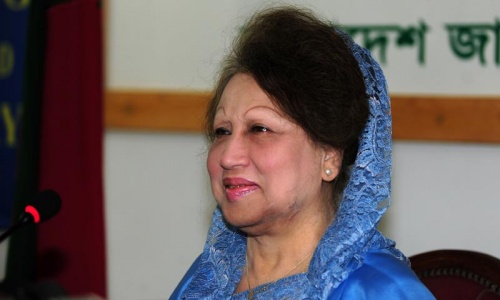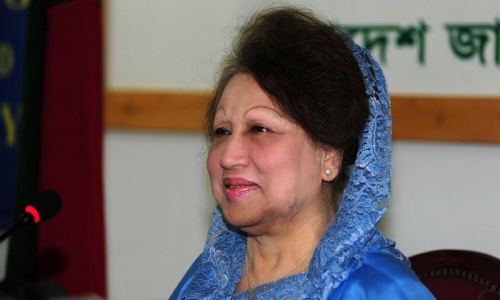FARIDPUR: Bangladeshi Prime Minister Sheikh Hasina said the country would hold the trial of main opposition leader Khaleda Zia one day for unleashing terrorism and militancy in the name of movement.
Speaking at a public rally in Faridpur on Thursday, she said: “We believe in justice. The opposition leader will be charged with issuing orders for killing and burning people to death. Her trial will be held on Bangladesh’s soil.”
Hasina, the chief of Awami League, was addressing the rally as part of the first leg of her electioneering for the Jan 5 polls in favour of party candidate Kazi Zafarullah.
Urging the opposition leader not to play with the fate of people, she said her arch rival would have to shoulder responsibility for the death of so many people across the country.
The Bangladesh Nationalist Party, headed by Zia, is at the head of an 18-party opposition alliance which has refused to take part in the polls after Hasina blocked their demands to stand down and let a neutral caretaker government oversee the contest.
Hasina argues the caretaker administration system enables the army to seize power in a country which has seen at least 19 coups since 1975.
Two other left-wing parties have also pulled out of the election as has a faction led by former dictator Hussain Muhammad Ershad, who had been an ally of Hasina's ruling Awami League.
The boycotts have highlighted the growing political polarisation in a country that won its independence from Pakistan in 1971.
While Bangladesh has had a deeply troubled history since independence, with more than a dozen coups, this year has been the bloodiest since it broke free from its former rulers in Islamabad.
Protests over the polls and over the death sentences handed down to those convicted of war crimes during the 1971 independence conflict have left at least 268 people dead since January.
Much of the violence has been blamed on supporters of Jamaat-i-Islami, the country's largest religious party which has been barred from fielding candidates on Jan 5.
Three rounds of UN-brokered last-minute talks between the government and opposition have failed to resolve the dispute between the Awami League and the BNP whose leaders despise each other.
The United States, European Union and the Commonwealth countries have announced they will not send observers to the elections, seriously denting its credibility.
Strikes and blockades have crippled the economy, affecting millions of poor farmers and the urban middle class in the impoverished South Asian nation.
By arrangement with The Daily Star/ANN















































